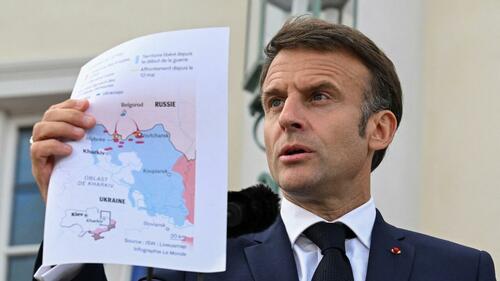
The Kremlin says that NATO member France is fast becoming a 'direct' participant in the Ukraine war, which threatens to drastically inflame tensions and escalate the conflict further, possibly beyond Ukraine's borders.
French President Emmanuel Macron on Friday committed to transferring Mirage fighter jets to Kiev, as well as set up a French training program for Ukrainian pilots. He said this while Zelensky and Biden were in France commemorating and attending D-Day 80th anniversary events. Macron went so far as to repeat his call for Western countries to be willing to send troops directly into Ukraine.
Kremlin spokesman Dmitry Peskov reacted as follows: "Macron demonstrates absolute support for the Kyiv regime and declares readiness for France's direct participation in the military conflict."

"We consider these statements to be very, very provocative, inflaming tensions on the continent and not conducive to anything positive," Peskov said Friday on the sidelines of the Saint Petersburg International Economic Forum.
Macron has pressed ahead undeterred despite repeat Moscow warnings, as The Washington Post observed:
The comment, made in a news conference with Ukrainian President Volodymyr Zelensky, is the latest sign that France and other allies may now be willing to put NATO country troops on Ukrainian soil — an idea that some allies, including the United States, have long considered potentially escalatory.
Macron on Friday called Ukraine’s request for in-country training “legitimate” and said several partners have “already given their agreement.”
“We are going to use the coming days to finalize a coalition, as broad as possible,” he said.
Some reports have claimed President Biden has talked Macron out of putting Western boots on the ground in Ukraine; however, Biden's message appears to more simply be that this action can't be taken without consensus withing NATO.
Indeed such a plan would run the risk of triggering NATO's Article 5 common defense treaty, and see nuclear-armed confrontation between Russia and the Western alliance.
"Against those who try to redefine borders by force in order to rewrite history, let us be worthy of those who landed here on this beach ..."
— Alex Taylor (@AlexTaylorNews) June 6, 2024
As Macron salutes the courage of Zelenskyi, the Grande Patrouille de France (🇫🇷 Red Arrows) flies past over Omaha Beach ... pic.twitter.com/iR0O20ef2Y
The below recent analysis by Responsible Statecraft shows why Macron's plan to get allies on board at this sensitive moment politically are likely doomed to failure [emphasis ZH]...
* * *
Macron stated that Russia must not “win” the war; but, like all the other leaders of NATO, he has never defined what he means by this. Perhaps he means fighting Russia to a standstill followed by a compromise peace. In private conversations, however, French officials simply echo the U.S. line that only the Ukrainians can make peace — and the Ukrainian terms for peace require not a stalemate, but the complete military defeat of Russia.
The need for Europe to develop a capacity for self-defense should be obvious. Having nailed themselves to the Biden administration, European governments have very belatedly woken up to the realization that the next president may well be Donald Trump, and that the U.S. commitment to Europe may radically diminish. Indeed, given U.S. problems at home and in the Middle East, plus growing tension with China, this commitment is likely to diminish in future whether or not Trump is elected.
However, Macron’s hope that the supposed threat from Russia will prompt Europe to unite militarily behind French leadership vastly exaggerates both French military power and European willingness to follow France’s lead. After years of budget cuts, the French army is far too weak to intervene in Ukraine without full U.S. support. When in 2011 President Nicolas Sarkozy of France tried to take the lead in the “humanitarian intervention” in Libya, within a very few weeks he was begging an unwilling President Obama to take over the operation on behalf of NATO, for fear of a humiliating Anglo-French failure.
In terms of appealing to other European countries, Macron’s hawkish stance on Ukraine is targeting East European partners. These governments, however, are precisely the countries with the most deeply-rooted determination to oppose European strategic autonomy and maintain until the bitter end the closest possible alliance with the United States.
The Kremlin says that NATO member France is fast becoming a ‘direct’ participant in the Ukraine war, which threatens to drastically inflame tensions and escalate the conflict further, possibly beyond Ukraine’s borders.
French President Emmanuel Macron on Friday committed to transferring Mirage fighter jets to Kiev, as well as set up a French training program for Ukrainian pilots. He said this while Zelensky and Biden were in France commemorating and attending D-Day 80th anniversary events. Macron went so far as to repeat his call for Western countries to be willing to send troops directly into Ukraine.
Kremlin spokesman Dmitry Peskov reacted as follows: “Macron demonstrates absolute support for the Kyiv regime and declares readiness for France’s direct participation in the military conflict.”

“We consider these statements to be very, very provocative, inflaming tensions on the continent and not conducive to anything positive,” Peskov said Friday on the sidelines of the Saint Petersburg International Economic Forum.
Macron has pressed ahead undeterred despite repeat Moscow warnings, as The Washington Post observed:
The comment, made in a news conference with Ukrainian President Volodymyr Zelensky, is the latest sign that France and other allies may now be willing to put NATO country troops on Ukrainian soil — an idea that some allies, including the United States, have long considered potentially escalatory.
Macron on Friday called Ukraine’s request for in-country training “legitimate” and said several partners have “already given their agreement.”
“We are going to use the coming days to finalize a coalition, as broad as possible,” he said.
Some reports have claimed President Biden has talked Macron out of putting Western boots on the ground in Ukraine; however, Biden’s message appears to more simply be that this action can’t be taken without consensus withing NATO.
Indeed such a plan would run the risk of triggering NATO’s Article 5 common defense treaty, and see nuclear-armed confrontation between Russia and the Western alliance.
“Against those who try to redefine borders by force in order to rewrite history, let us be worthy of those who landed here on this beach …”
As Macron salutes the courage of Zelenskyi, the Grande Patrouille de France (🇫🇷 Red Arrows) flies past over Omaha Beach … pic.twitter.com/iR0O20ef2Y
— Alex Taylor (@AlexTaylorNews) June 6, 2024
The below recent analysis by Responsible Statecraft shows why Macron’s plan to get allies on board at this sensitive moment politically are likely doomed to failure [emphasis ZH]…
* * *
Macron stated that Russia must not “win” the war; but, like all the other leaders of NATO, he has never defined what he means by this. Perhaps he means fighting Russia to a standstill followed by a compromise peace. In private conversations, however, French officials simply echo the U.S. line that only the Ukrainians can make peace — and the Ukrainian terms for peace require not a stalemate, but the complete military defeat of Russia.
The need for Europe to develop a capacity for self-defense should be obvious. Having nailed themselves to the Biden administration, European governments have very belatedly woken up to the realization that the next president may well be Donald Trump, and that the U.S. commitment to Europe may radically diminish. Indeed, given U.S. problems at home and in the Middle East, plus growing tension with China, this commitment is likely to diminish in future whether or not Trump is elected.
However, Macron’s hope that the supposed threat from Russia will prompt Europe to unite militarily behind French leadership vastly exaggerates both French military power and European willingness to follow France’s lead. After years of budget cuts, the French army is far too weak to intervene in Ukraine without full U.S. support. When in 2011 President Nicolas Sarkozy of France tried to take the lead in the “humanitarian intervention” in Libya, within a very few weeks he was begging an unwilling President Obama to take over the operation on behalf of NATO, for fear of a humiliating Anglo-French failure.
In terms of appealing to other European countries, Macron’s hawkish stance on Ukraine is targeting East European partners. These governments, however, are precisely the countries with the most deeply-rooted determination to oppose European strategic autonomy and maintain until the bitter end the closest possible alliance with the United States.
Loading…





